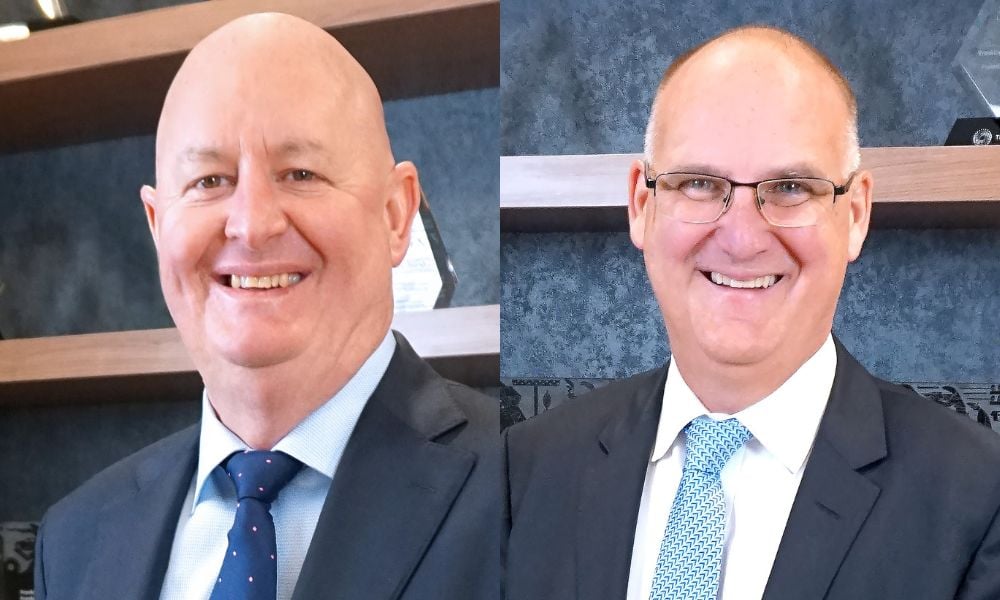Global and local leaders from Franklin Templeton explain how they adapt their offerings to suit the unique needs of Canadian advisors and their clients

For a company with the global scale and reach of Franklin Templeton, operating in a market like Canada requires a high degree of selective direction. The firm manages a total of approximately $1.6 trillion (USD), and employs over 10,000 employees, 1,600 of whom are investment professionals. They’ve grown considerably, in part through major acquisitions like the 2020 purchase of Legg Mason, and this growth has seen their capabilities grow as well. As they go about their work in Canada, their leaders must strike the delicate balance between local demand and global innovations without overcrowding the shelf.
Andrew Ashton and Dennis Tew embody that global and local balance. Ashton is the chairman of Franklin Templeton Canada, as well as the head of the UK for Franklin Templeton. Tew is the head of distribution and business strategy in Canada. They explained how they work together with the advisory community and leadership at advisory firms to provide a menu of capabilities in line with the needs and expectations of Canadian advisors and their clients.
“In all the markets that we deal with, we want to have this consultative approach to how we run our business and how we look to solve for client challenges,” Ashton says. “A lot of that comes from the scale of the business that we have. We can’t be a product pusher, we have to have conversations where we try to understand what the challenges a client faces and what solutions they might need. Then you can be more targeted, because when you have such a breadth of capabilities on offer you don’t just say ‘hey we can do anything you want.’ You can be more focused on understanding a specific client’s challenges and how you solve for them.”
Tew explains that for Franklin Templeton Canada, the conversations held at both the advisor and the firm level are essential. Firm conversations are key to set parameters and understand the strategic goals of organizations. Those advisor conversations inform product development.
One of the major areas of growth that Franklin Templeton has identified both globally and within Canada is in private assets or alternatives. Between 2019 and 2024, Ashton explains, their alternatives business has grown from $45 billion (USD) in assets to $250 billion (USD). That growth has been driven in part by institutional appetites, but the retail high net worth segment has become a significant source of investment in these assets too. These clients, they explain, are seeking diversification and non-correlated returns. The acquisition of Legg Mason added a considerable amount of alternatives capability to Franklin Templeton, as well as a unique opportunity for the Canadian market.
Because Legg Mason had no presence in Canada prior to the acquisition, Franklin Templeton could be strategic about the exact capabilities they would roll out in Canada as well as the vehicles by which they could be accessed. As they rolled out these products, Tew and Ashton explain that there was a heavy investment in educational resources for advisors and clients. Given the relative novelty of some of these assets and strategies, as well as other factors like limits in transparency and liquidity, education was essential.
“It was a big strategic initiative of ours to bring our flagship private markets to Canada this year. While there was one cohort of advisors that understood these assets we noticed that education was lacking in the rest of the marketplace,” Tew says. “So taking some of the materials that we have globally, we have worked to be a leader in that education space in Canada and bring the whole industry along with us.”
Beyond support and education with new private asset products, Tew and Ashton explain that Canadian advisors have called for additional support on fixed income products. Given what they see as a large amount of cash sitting on the sidelines, and potential reticence to enter equity markets at a high, many of the conversations Tew’s team is having with Canadian advisors are on the subject of fixed income.
Ashton explains that this client-centric view of product strategy has been a driving force for Franklin Templeton’s own growth in Canada. Because there are so many new global capabilities that the firm has access to, they can bring those ideas to this country based on what their clients tell them. The result has been the achievement of an all-time AUM high in Canada of $58 billion as of November 30th of last year.
“We're having a very successful run. I think there's a big disconnect between what Canadian advisors think Franklin Templeton is and what we actually are today, and that's on us to get that information out,” Tew says. “We bring industry leading asset management capabilities across all asset classes, public and private. As well as a solutions business that can package that together and help advisors build models for different client portfolios. We’re approaching partnership and value add beyond investments, through education and out ability to take all of what we do and customize it down to the dealer level, the advisor level, and the client level.”



